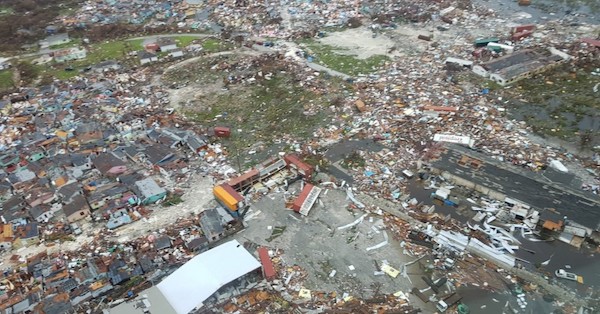disaster management
See the following -
'Open.Michigan' Translation Project: Case Study On Health Education For Uganda
Back in January, we launched our translation pilot for Open.Michigan, focusing on two video series for health education. We are thrilled to report that the translation activities are still going strong—57 volunteers to date, 53 videos that include 128 completed translations covering 11 languages, and expansion into our family medicine video series. We are amazed at the skill and dedication of our volunteer translators. Read More »
- Login to post comments
Confronting Catastrophic Disasters With 21St Century Technologies
 The unfolding tragedy in the Bahamas demonstrates that the 21st century will be marked by increasingly frequent, often catastrophic disasters of unprecedented scope and scale. Yet again, the unprecedented challenges of disaster management are being met with mostly conventional, labor-intensive, costly, and often inadequately slow response efforts. These 21st-century threats, particularly those that affect livelihood, health, and well-being, deserve the application of 21st-century technologies. Read More »
The unfolding tragedy in the Bahamas demonstrates that the 21st century will be marked by increasingly frequent, often catastrophic disasters of unprecedented scope and scale. Yet again, the unprecedented challenges of disaster management are being met with mostly conventional, labor-intensive, costly, and often inadequately slow response efforts. These 21st-century threats, particularly those that affect livelihood, health, and well-being, deserve the application of 21st-century technologies. Read More »
- Login to post comments
Drones and the Future of Disaster Response
 Four continental states and one U.S. territory took a beating this fall as one natural disaster after another rocked communities in Northern California and along the Gulf Coast, spreading disaster relief resources and personnel thin as federal, state, and local governments scrabbled to address the crises. Wildfires in California's wine country claimed at least 42 lives, 8,400 structures, and 245,000 acres of land in October. Hurricanes Harvey and Irma pummeled Louisiana, Texas, and Florida only to be followed by Hurricane Maria, which slammed Puerto Rico on September 20 and left much of the U.S. territory without communications systems, electricity, clean water, or functioning hospitals....
Four continental states and one U.S. territory took a beating this fall as one natural disaster after another rocked communities in Northern California and along the Gulf Coast, spreading disaster relief resources and personnel thin as federal, state, and local governments scrabbled to address the crises. Wildfires in California's wine country claimed at least 42 lives, 8,400 structures, and 245,000 acres of land in October. Hurricanes Harvey and Irma pummeled Louisiana, Texas, and Florida only to be followed by Hurricane Maria, which slammed Puerto Rico on September 20 and left much of the U.S. territory without communications systems, electricity, clean water, or functioning hospitals....
- Login to post comments
How Laboratories and their Systems can Weather Natural Disasters and Pandemics
 We are currently experiencing a global pandemic - which, while perhaps included in disaster preparedness Standard Operating Procedures (SOPs) by many labs as a possible disaster, still has caught most the infrastructure and health systems of most nations largely unprepared, and is causing major disruption because it was arguably not seen as one of the most likely events. Disaster preparedness has typically tended to focus on IT and data management risks and/or natural disasters. SOPs center around standard, daily lab safety. The truth is that whatever the odds of a particular disaster, they become 100% once they happen. It's important to have sufficient risk-reduction SOPs in play, and a good Continuity Of Operations Plan (COOP) for each potential scenario to ensure the best chance of coping during the event and recovering afterwards.
We are currently experiencing a global pandemic - which, while perhaps included in disaster preparedness Standard Operating Procedures (SOPs) by many labs as a possible disaster, still has caught most the infrastructure and health systems of most nations largely unprepared, and is causing major disruption because it was arguably not seen as one of the most likely events. Disaster preparedness has typically tended to focus on IT and data management risks and/or natural disasters. SOPs center around standard, daily lab safety. The truth is that whatever the odds of a particular disaster, they become 100% once they happen. It's important to have sufficient risk-reduction SOPs in play, and a good Continuity Of Operations Plan (COOP) for each potential scenario to ensure the best chance of coping during the event and recovering afterwards.
- Login to post comments
Open Source Resources for major Disaster & Emergency Management Situations
 As everyone knows by now, the superstorm known as 'Hurricane Sandy' has caused considerable devastation across the East Coast of the United States and all the way up to the Great Lakes region. The effects of the storm will continue to be felt for days and weeks as major portions of the East Coast are without electricity and flooding is expected to continue for days. Under these circumstances, it seemed appropriate to put together a listing of open source applications that have been successfully used in emergencies and disaster recovery all over the world. In times of man-made crises or natural disasters, there is a range of organizations, websites, open source tools, mobile apps, and more that might be of use to first responders and citizens in general. Check out some of the following resources...
As everyone knows by now, the superstorm known as 'Hurricane Sandy' has caused considerable devastation across the East Coast of the United States and all the way up to the Great Lakes region. The effects of the storm will continue to be felt for days and weeks as major portions of the East Coast are without electricity and flooding is expected to continue for days. Under these circumstances, it seemed appropriate to put together a listing of open source applications that have been successfully used in emergencies and disaster recovery all over the world. In times of man-made crises or natural disasters, there is a range of organizations, websites, open source tools, mobile apps, and more that might be of use to first responders and citizens in general. Check out some of the following resources...
- Login to post comments
Three Students Jump into Open Source with OpenMRS and Sahana Eden
 We are three students in the Bachelor of Computer Science second degree program at the University of British Columbia (UBC). As we each have cooperative education experience, our technical ability and contributions have increasingly become a point of focus as we approach graduation. Our past couple of years at UBC have allowed us to produce some great technical content, but we all found ourselves with one component noticeably absent from our resumes: an open source contribution. While the reasons for this are varied, they all stem from the fact that making a contribution involves a set of skills that goes far beyond anything taught in the classroom or even learned during an internship. It requires a person to be outgoing with complete strangers, to be proactive in seeking out problems to solve, and to have effective written communication...
We are three students in the Bachelor of Computer Science second degree program at the University of British Columbia (UBC). As we each have cooperative education experience, our technical ability and contributions have increasingly become a point of focus as we approach graduation. Our past couple of years at UBC have allowed us to produce some great technical content, but we all found ourselves with one component noticeably absent from our resumes: an open source contribution. While the reasons for this are varied, they all stem from the fact that making a contribution involves a set of skills that goes far beyond anything taught in the classroom or even learned during an internship. It requires a person to be outgoing with complete strangers, to be proactive in seeking out problems to solve, and to have effective written communication...
- Login to post comments